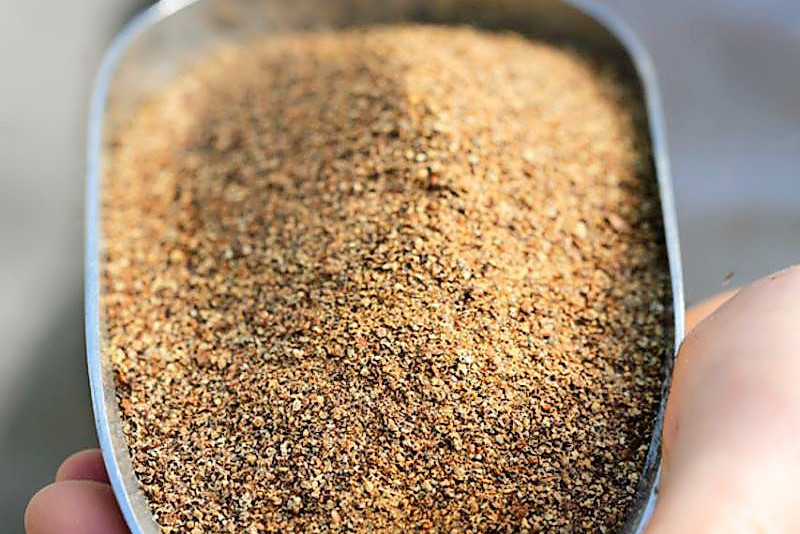Canola meal in swine nutrition

Canola meal can be used as a cost-effective protein substitute for other protein sources such as soya bean meal in pig diets. Here we describe the latest insights.
Depending on its relative nutritive value and cost, it is economical to replace soya bean meal partially or fully with canola meal. The literature contains enough evidence that canola meal has been used for more than 40 years in swine diets.
Starter pig diets
It appears that the majority of the studies on canola meal use in starter pig diets were mainly focused on growth performance. In the past, it was suggested that complete or partial replacement of soya bean meal with canola meal had negative effects on pig performance. It was also documented that increasing inclusion of canola meal linearly reduced average daily gain (ADG) and average daily feed intake (ADFI) in weaned pigs.
In a preference trial, weaned pigs were offered a choice between a soya bean meal based control diet and canola meal at 5-20% inclusion level. Results indicated that pigs preferred to eat the soya bean meal based control diet more than any of the diets containing canola meal. There was also a significant reduction in the amount of feed consumed when the canola meal inclusion level was increased from 5 to 20%.
The possible reason for the low intake of a diet containing canola meal by starter pigs may be the influence of glucosinolate breakdown products on thyroid function and the reduced palatability due to the presence of glucosinolate and their breakdown products.
Recent findings, however, are contrary to the results of past research. For instance, a recent study reported that either solvent-extracted (SE) canola meal or expeller-pressed (EP) canola meal at 150 g/kg inclusion level combined with crude glycerol can partially replace soya bean meal and wheat in weaned pig diets.
Growth performance
In a study by a team around J.L. Landero, University of Alberta, Canada, a few years ago, in total 0, 50, 100, 150 and 200 g SE canola meal/kg, in replacement for soya bean meal, was fed to weaned pigs. It was found that from 0 to 28 days on trial, increasing inclusion of SE canola meal up to 20% did not affect body weight gain, feed intake and feed efficiency, although increasing inclusion of canola meal reduced linearly the apparent total tract digestibility (ATTD) of energy, dry matter (DM), crude protein (CP) and quadratically the dietary energy (DE) content of the diets.
The team conducted another experiment to determine the effect of feeding increasing levels of EP canola meal up to 200 g/kg diet to weaned pigs. They found no significant differences in growth performance although there were linear reductions in ATTD of dry matter, energy and crude protein.
In a more recent study, a team around N. Sanjayan (one of the authors of this article) demonstrated that SE canola meal from Brassica napus black and Brassica juncea yellow (a species of the mustard plant) can be included in the weaned pig diets at up to 25% without adverse effect on the growth performance, see Table 1.
In another study, G. Mejicanos (another author of this article) evaluated high levels of inclusion of parent and dehulled B. napus and B. juncea canola meal replacing soya bean meal at 15% level and found increased growth performance when using Fine 2 dehulled canola meal.
There were 2 possible explanations proposed for the improved performance of weaned pigs at high canola meal inclusion:
- Diets in the past were formulated mainly based on crude protein and dietary energy and not on standard ileal digestible (SID) amino acids or net energy.
- Recent cultivars of canola meal have comparatively low amounts of glucosinolate compared to old cultivars.
Grower, finisher pig diets
Previous studies reported that canola meal can be used to replace only up to 50% of the supplemental protein from soya bean meal in grower pigs. However, replacement of 75% or complete replacement of soya bean meal by canola meal significantly reduced the growth performance.
Studies to determine the digestibility of nutrients of canola meal have been conducted. For instance, a team around J.M. Bell at the University of Saskatchewan, Canada, reported in 1998 that B. napus black and B. juncea yellow had similar digestible protein and energy in finisher pigs. An experiment using toasted and non-toasted black and yellow seeded B. napus and yellow B. juncea in grower pigs suggested that dietary energy and net energy content of B. napus yellow seeded is higher than that of conventional B. napus black and B. juncea.
The Canadian National Research Council indicates net energy value for SE canola meal from black B. napus to be net energy for yellow seeded B. napus, which averaged 2,102 kcal/kg, while values for yellow B. juncea averaged 2,340 kcal/kg.
The SID amino acids of SE canola meal and EP canola meal in grower pigs has been reported by several studies. In the mentioned studies, EP canola meal had greater digestible amino acids compared to SE canola meal.
A blast from the past: 2016 – High-protein canola meal could prove to be a valuable ingredient in swine diets, this is according to a new study at the University of Illinois, United States. Read more…
Carcass characteristics
Previous studies also indicated that canola meal can be included in pig diets without affecting growth performance and carcass characteristics of the finisher pigs. A performance study was conducted in grower pigs with a decreasing amount of expeller extracted canola meal (22.5%, 15%, 7.5% and 0%) to validate the performance and carcass characteristics.
Increasing the inclusion level of expeller extracted canola meal did not affect carcass characteristics, such as back fat thickness, loin depth, jowl fat and fatty acid profile; ADG, however, was reduced by 3 g/day per 1% inclusion of EP canola meal.
Sow diets
In 2001, an Australian team of researchers around R.H. King evaluated the effect of diets containing up to 20% of SE canola meal on sow performance. Results indicated that average sow performance and piglet weight were not affected by the different levels of canola meal in the diets.
A team around Dr Natalie Quiniou, French Pork and Pig Institute, studied the effects of feeding 10% of low-glucosinolate rapeseed meal (B. napus) during gestation and lactation, over three reproductive cycles, on the performance of hyper-prolific sows and their litters and found no differences when compared to diets containing no rapeseed meal. In their study, sows farrowed 43.6 and 43.8 piglets over three reproductive cycles, respectively. Piglet weight at birth or weaning survival and litter weight gain were not affected by dietary inclusion of canola meal.
Canola meal can be an alternative
Canola meal offers an alternative in swine diet as it is a cost-effective protein source. This literature review provided information about the nutritive value of canola meal and recent techniques (i.e. development of new canola cultivars, dehulling of canola meal, and supplementation of feed enzymes and fermentation) that have been used to improve the nutritive value of canola meal and overcome the limitations encountered by the swine industry and its use as feedstuff.
References available from the authors. This article is a resized version of an overview that appeared in All About Feed and Oilseeds Focus.











